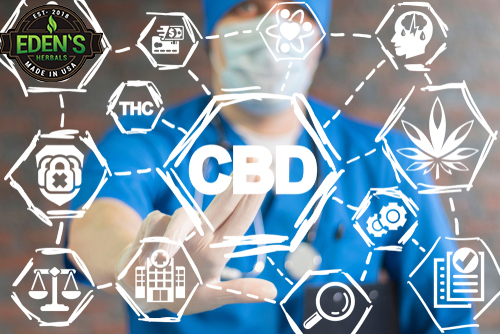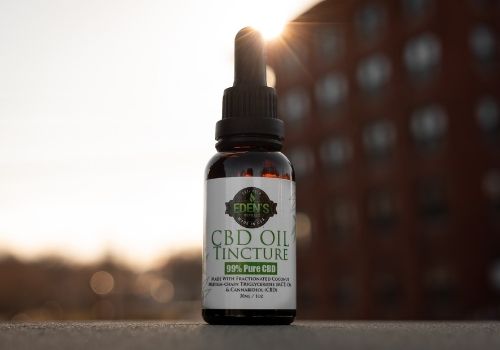 Cannabidiol, CBD, is achemical compound extracted from the CannabisSativa plant. Cannabis Sativa includes hemp and/or marijuana.
Cannabidiol, CBD, is achemical compound extracted from the CannabisSativa plant. Cannabis Sativa includes hemp and/or marijuana.
CBD occurs naturally and is used in edibles or oils to calm and relax the user. CBD alone is not psychoactive. You will not experience any side effects like feeling altered, sedated, or euphoric.
The psychoactive effects of marijuana are caused exclusively by THC. THC and CBD are two different cannabinoids, both found in cannabis sativa. Hemp is high in CBD but low in THC. Marijuana is the opposite, low in CBD but a high level of THC.
This, along with issues of legality, is why most CBD is extracted more commonly from the hemp plant and not marijuana.
It is worth noting; some people react differently to CBD. To be safe, if you are taking CBD for the first time, do it under supervision.
There are various CBD products available in the market. This ranges from food, drugs, dietary supplements, health products for animals, and cosmetics. People with insomnia, anxiety, and chronic pain, can use these products.
It's important to understand the side effects and benefits of CBD, so let's dive in.
 Benefits of Using CBD
Benefits of Using CBD
Using CBD oil has many benefits.
These include reducing acne, relieving chronic pain, improving heart health, calming anxiety, reducing depression, reducing cancer-related symptoms, positively impacting the brain, antioxidant properties, and reducing epileptic seizures.
Reduce Acne
Acne is caused by various factors such as underlying inflammation, genetics, sebum overproduction, and genetics. Many people across the planet struggle with acne.
CBD has properties that can reduce sebum production. It also contains anti-inflammatory properties, which can help treat acne. Different studies have shown that CBD is a safe and effective way to treat acne.
Relieve Chronic Pain
Cannabis has been used medicinally worldwide since roughly 2900 BC. Research suggests that CBD is one of the most potent pain relieving cannabinoids in the cannabis plant.
Recent studies show that when used independently, CBD reduces pain. Using CBD may also ease peripheral neuropathy.
 Benefit Heart Health
Benefit Heart Health
Studies show that CBD has benefits to the circulatory system and the heart, including the ability to lower high blood pressure.
High blood pressure presents many health risks, including metabolic syndrome, stroke, and heart attack.
Research suggests that the anxiety and stress-reducing properties CBD contains are what make it help lower high blood pressure.
Calm Anxiety
Anxiety is a mental health problem that can take a harsh toll on an individual's well-being and health. CBD products have been found to reduce anxiety in users.
The pharmaceutical drugs used to treat anxiety have several side effects such as insomnia, agitation, drowsiness, headaches, and sexual dysfunction. Some medication may even lead to addiction, hence causing substance abuse.
CBD oil is a natural and safe approach, and there is no risk of a user abusing it.
Reduce Cancer Related Symptoms
CBD may reduce cancer treatments' side effects such as vomiting, pain, and nausea, and may also reduce cancer-related symptoms.
Although, with cancer pain relief, CBD is typically combined with a small amount of THC. Studies showed that patients who used these two compounds experienced pain relief, compared to the patients who only used cancer pain medication.
This is not to discredit cancer pain medication. It is just that sometimes they can be combined with CBD for maximum relief.
 Reduce Epileptic Seizures
Reduce Epileptic Seizures
The FDA approved Epidiolex in 2018 as the first pharmaceutical CBD medication.
Epidiolex is used to treat seizures in two severe and rare epilepsy types, namely, Dravet syndrome and Lennox-Gastaut syndrome, which occurs in people who are 2years or older.
Clinical trials showed that when people with this syndrome combined other seizure medication with Epidiolex, they had fewer seizures.
It has not yet been established if CBD can help people with other forms of epilepsy.
Other CBD Effects
CBD has several other potential benefits other than the ones listed above. More study is needed to prove this, but CBD is thought to provide health benefits like diabetes prevention, antipsychotic effects, anti-tumor effects, and substance abuse treatment.
Negative Side Effects of CBD
Like everything else, CBD has its side effects, although they occur very rarely. When side effects do occur, they are typically very mild.
Also, note that since CBD supplements come in different forms such as vapors, tinctures, oils, and gummies, the absorbed amount varies. This plays a role in the kind of side effects, if any, a person may experience.
It is advisable that pregnant women not use CBD since it may affect the baby's development.
The common side effects of CBD include dry mouth, diarrhea, fatigue, drowsiness, nausea, interaction with other drugs, lightheadedness, and appetite loss.
Below are some of these side effects discussed in detail.
 Nausea
Nausea
In rare cases, some people may experience nausea after ingesting CBD supplements. This is dependent on the amount of CBD the person has ingested and how sensitive they are to CBD.
Interference with Other Drugs
If you are on other medication, it would be best to consult your doctor before taking CBD as it may interfere with your medication.
CBD can interact with your medication to decrease the effectiveness or increase the toxicity of the medication. So only take CBD after your doctor has assured you it will not affect the medication you are taking.
Dry Mouth
Dry mouth or cottonmouth is a potential side effect of CBD. It can also cause your eyes to feel dry.
This is a more common side effect of THC, but it can also occur with CBD.
Diarrhea
You may experience liver problems or diarrhea while using CBD. However, this depends on an individual's medical history and their sensitivity.
Therefore, it is important to monitor your intake.
CBD Long Term Side Effects
Thus far there have been no documented long term side effects of regular doses of CBD. This natural plant remedy has been found to have no addictive properties.
Due to the way CBD interacts with your receptors, you are unlikely to build up a tolerance to CBD. This means increasing dosages will not be necessary over time.
While more long term scientific research is needed, the data so far suggests CBD is safe for long term use.
 Conclusion
Conclusion
In conclusion, the benefits of CBD have been shown to outweigh the risk of side effects.
Not everyone will experience the stated side effects, and should one experience them, they are mild and manageable, even in high doses.
In a low dosage of CBD, side effects are even less likely.
People tend to use CBD for the benefits stated above, like, pain relief, relaxation, and for its calming nature.
However, remember that the FDA has not regulated CBD, except for Epidiolex. Therefore, it is important to find a trustworthy retailer that can help you determine a safe and effective starting dose.
Ensure that when you get CBD, it has been tested by a third party and is from a reputable source with a large number of customer reviews. This will ensure that the content in the CBD is safe and reliable.
CBD should be grown organically, be free of heavy metals and pesticides. It is important to do your research and consult a doctor on whether it is safe for you to use CBD.
*These statements have not been evaluated by the Food and Drug Administration. CBD is not meant to diagnose, treat, or cure any particular ailments. We recommend consulting a qualified physician before starting a new CBD regiment.


